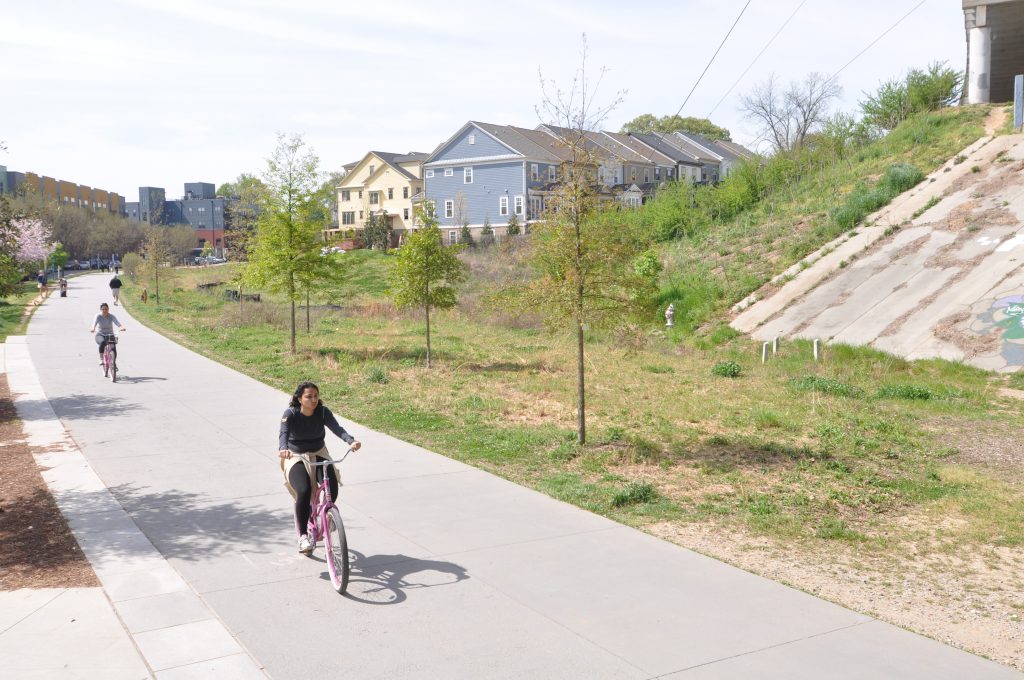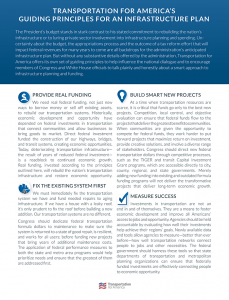As a valued member, Transportation for America is dedicated to providing you the latest information and developments around federal policy.
Tax Reform
House: On Thursday November 16th, the House of Representatives passed H.R. 1, the “Tax Cuts and Jobs Act,” also known as the Republican’s tax reform package. The bill passed by a vote of 227-205; 227 Republicans voted for the legislation, and 192 Democrats and 13 Republicans voted against the legislation.
What Does this Bill Mean for Transportation?
The bill proposes changes to commuter tax benefits for parking, van pooling, and riding transit and terminates private activity bonds (PAB’s). Employers will no longer be able to deduct or “write off” the subsidy they provide for fringe benefits, including commuting benefits. The bill maintains the ability for employers to provide either a pre-tax benefit or a subsidy. In the case of a subsidy, while the employer can no longer write off this expense, they will not have to pay payroll taxes on the fringe benefit. There is no change to the benefits associated with providing the pre-tax benefit.
Private activity bonds are tax-exempt bonds used to fund a whole range of infrastructure projects that have a “private” use of at least 10%. PAB’s have been used to finance a wide range of infrastructure projects around the country, including roads, highways, housing, hospitals and airports. Recently, PAB’s have been used to fund a lot of transportation projects that are using private public partnerships for financing, including the Purple line in Maryland and the Rapid Bridge Replacement Project in Pennsylvania.
The House’s elimination of PAB’s will greatly harm the ability for state and local governments and private entities to obtain financing and build infrastructure projects that use financing tools, such as toll roads and transit and rail stations. This step is directly at odds with President Donald Trump’s proposal to expand the use of PAB’s to help fulfill his promise to rebuild America’s infrastructure.
Senate: The Senate Finance Committee approved the Senate version of the tax reform package on Thursday November 16th by a party line vote of 14-12. All Republicans voted in favor and all Democrats were opposed. The Senate bill keeps both the commuter benefits and private activity bonds intact, but does eliminate the $20 a month benefit for people who bike to and from work. The House bill also eliminates the bike benefit. T4America is joint signatory of a letter to members of Congress urging them to preserve the bike benefit because it promotes physical activity, reduces traffic congestion and air pollution and promotes walkable communities.
The Senate is scheduled to consider the Senate Republican tax bill when they get back from Thanksgiving recess. Congressional Republicans and the White House hope to have a tax bill on President Trump’s desk by Christmas. It is still unclear whether the Republicans have the votes to pass the tax bill in the Senate. All the Democrats are opposed to the bill so Republicans can only lose two votes and still pass their bill. Right now, Senator Ron Johnson (WI) says he is opposed to the bill in its current form and other senators like Susan Collins (ME), Lisa Murkowski (AK), Bob Corker (TN) and Jeff Flake (AZ) continue to be undecided on if they will support the bill.
One final possible hiccup for the Republican tax reform bill is a congressional budget provision known as the “Pay As You Go” (paygo) rule”. Paygo requires immediate, across-the-board spending reductions to many mandatory programs like Medicare and Medicaid for any bill that reduces taxes and doesn’t fully offset them with revenue increases elsewhere. The GOP tax cut plan would add $1.5 trillion to the debt over the next decade. Under paygo rules, the government would have to make $150 billion in mandatory spending cuts every year for the next 10 years, unless that provision is waived with 60 votes in the Senate, which would require Democratic support. If the Paygo rule is not waived, not only will mandatory spending programs like Medicare take an automatic 4% spending cut, Congress will have to cut a lot of discretionary spending elsewhere to comply with the Paygo rules. Cuts to defense spending are a non political starter right now, so Congress would likely cut from the non-defense discretionary spending accounts. This fact means that funding for popular programs like TIGER, Capital Investment Grants and Amtrak are at risk to be severely cut back or even eliminated entirely if this tax reform bill passes.
The bottom line is that the Republican tax reform bill, especially the House version, will make it harder for state and local governments to make much needed infrastructure investments by stripping away financing tools that governments and private entities rely on. Additionally, the tax bill will potentially lead to devastating discretionary spending cuts that could eliminate programs like TIGER that we fight to fund every year because they are vital to our communities and economies. These two outcomes break the promises made by both the President and Congress to invest more in our infrastructure, not less.
U.S. Department of Transportation (U.S. DOT) Nominations Confirmed
During the week of November 13th, the U.S. Senate confirmed two U.S. DOT nominations. Derek Khan was confirmed to be Undersecretary of Transportation for Policy and Steven Bradbury was confirmed to be General Counsel for U.S. DOT. Mr. Kan’s nomination hearing was held in June and he had bipartisan support, but his nomination was held up by New York and New Jersey Senators concerned over the Trump’s administration’s withdrawal from a non-binding commitment with New York and New Jersey to fund half of the Gateway project. Mr. Kan was confirmed by a vote of 90-7.
Mr. Bradbury was confirmed by vote of 50-47. His nomination was more controversial because of his work at the Office of Legal Counsel in the Department of Justice under President George W. Bush. All Democratic Senators and Republican Senators John McCain (AZ) and Rand Paul (KY) opposed Mr. Bradbury’s nomination.
Nomination of Lynn Westmoreland
Additionally, the Senate Commerce and Transportation Committee on November 8th, reported favorably via voice vote the nomination of former Congressman Lynn Westmoreland to the Amtrak Board of Directors. There is no timeline right now for when the full Senate may consider his nomination.
Westmoreland served in Congress for twelve years, including a six-year stint on the Railroads Subcommittee of the House Transportation and Infrastructure Committee. During Westmoreland’s tenure in Congress he voted twice to cut Amtrak’s funding, including a vote for a failed bill in 2009 that would have eliminated all federal funding for the passenger railroad.
At a confirmation hearing in the Senate Commerce Committee on October 31, Westmoreland said he does support Amtrak funding, but that “the Board should look at the long-distance routes” and “should shutter these ‘unprofitable’ routes.” In his response to written questions from Senator Roger Wicker (R-MS), a member of the committee, about his votes to cut funding for Amtrak’s long distance routes, Westmoreland deflected and said his vote for the 2015 FAST Act demonstrates his support for Amtrak because it “reauthorized funding for Amtrak.”
Amtrak will only survive politically if it is a robust national system that serves as many states and communities as possible. Mr. Westmoreland has not adequately justified his prior votes to cut Amtrak funding and considering his Senate Commerce Committee testimony; we remain extremely concerned about Mr. Westmoreland’s commitment to funding long distance train routes. Given the vital importance of long distance Amtrak routes and Mr. Westmoreland’s record in opposition to those routes, we don’t think he is a good fit for the Amtrak board.
Sign-on letter to support transit capital funding
Reps. Earl Blumenauer (D-OR) and Jackie Walorski (R-IN) are leading a sign-on letter calling for funding for the transit Capital Investment Grant program in the FY2018 federal funding bill. These champions are collecting signatures on this important letter, which they will then send the to senior appropriators and leadership. Please let your Representatives know how important transit funding is to your region and encourage them to sign on to this letter. We will keep you updated on the timing of the appropriations process and negotiations.














